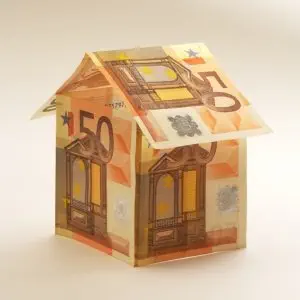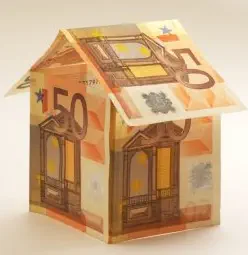

HOME | ABOUT | ARTICLES | NEWS | CONTACT US | TESTIMONIALS | DUE DILIGENCE
ARTICLES
Why Property is more Profitable than Stocks and Shares
When discussing the pros and cons of investing in stocks and shares, instead of property, we are also discussing the pros and cons of investing in traditional pensions
vs. property; because most traditional pensions are invested in global stock markets.
Even today, analysts will often argue that property is the better investment in any given year, than stocks and shares. A distorted picture is often given, largely
unintentionally, to the detriment of property investment; as they do not take into account or explain some of the major advantages that property investment has over
stocks and shares.
Here’s an example of what an analyst might say: -
Analyst: In Year X, average property prices increased 5% and the stock market was up 10%. This implies stocks and shares
performed better. This year, Year Y, property prices increased 10% and the stock market was up 5% so this suggests property
clearly performed better.
While what is being said is true it can also be quite misleading. You can understand why many people, when glancing at
the figures would think that in Year X they should have been investing in stocks and shares and that in Year Y they should
have been investing in property.
The Return on Investment (ROI) from property in both cases can have easily been higher. …Why? Because you can borrow money from a bank (or similar institution) to
buy property and have that loan secured against the property that is being purchased. You cannot do this with shares.
Banks will not have shares as security since they are, by nature, volatile. Not only can they increase or decrease in value, but can also lose their entire value overnight.
Companies can quickly disappear due to a variety of reasons; from bad management, strong competition, abnormal market conditions to corruption or even just new
technology introductions. The Northern Rock situation is a good (if ironic) example of this happening. In any case, the result of this is that property investors can
benefit from gearing on their investment whilst investors in stocks & shares cannot. Here is an example of what that means and the effects on the Holy Grail of the
investor, Return on Investment.
In order to buy £100,000 worth of shares you need £100,000. However, in order to buy a £100,000 property you might typically only need £20,000. The rest can be
borrowed from the helpful banks who agree with you that secured on the property being purchased their money is safe as houses – at the end of the day their thoughts
are that people will always need somewhere to live and, historically, it can be seen, that property prices have doubled every 7 to 10 years - even after taking into
account, a couple of major property price crashes.
Once a property is purchased and a mortgage is in place the icing on the cake is that you can then rent out property to pay not only for its upkeep but also for the cost
of the loan, the interest payable on the amount borrowed to part fund its purchase. This means that as opposed to what you might read in the papers, actual
comparative Return on Investment for an actual typical investor for Years X & Y would be as follows:
Year X
Value Held
% Increase Over Year
Profit
Stocks & Shares
£20,000
10%
£2,000
Property
£100,000
5%
£5,000
Year Y
Value Held
% Increase Over Year
Profit
Stocks & Shares
£20,000
5%
£1,000
Property
£100,000
10%
£10,000
Property is a clear winner in both years - it can be seen that even in a year when the stock market outperformed the property
market by 2:1 'property ROI' actually outperformed 'stocks and shares ROI' by 2.5 : 1. It is this Return on Investment that
investors are concerned with not overall market movements. With the market situations reversed the ROI from property
massively outperformed the ROI from stocks and shares by 10:1, and clearly we're not talking about fantasy situations here -
it's no coincidence that the majority of the world’s richest people have the bulk of their fortune in property.
(Side Note: The exact situation above clearly isn’t always the case. In property markets that are seeing exceptional property value growth
(capital growth) we are often prepared to take a 'hit' on rental income in order to purchase in places showing exceptional capital growth.
In these areas, everyone is trying to buy in order to take advantage of the situation and few actually want to rent…the result of this is
that rental returns tend to be lower meaning that mortgage payments may well not be fully met by rental income, although this should be more than made up for by the handsome
increase in value of the property.
This is also a function of the fact that rental returns in any case lag behind the increase in property values by a few years, so if large price increases are seen in a property market it takes
rents a few years to catch up. A good example of these situations is to contrast Germany with Poland….Germany good rental returns, virtually no capital growth for 10 years (!),
Poland not great rental returns but exceptional capital growth. In time the rents in Poland will also catch up with the higher property prices.)
The idea behind smart property investment is to use other people’s money, (from banks and from people renting the
property) to fund YOUR property investment.
Not everyone is happy or comfortable with taking on high levels of debt in order to fund property purchases and that's fine,
it's horses for courses and quite frankly it doesn't suit everyone’s position. We wouldn't advise it for elderly people for
instance as if there was a short term downturn in the market ('gearing' or 'leverage' magnifies the downside as well as the
upside) it would be more difficult for them to ride out a difficult period waiting for values to bounce back....as they always
have.
A good thing about property is that when a slump in values does occur it has a (but again delayed)knock on effect on rents
as they then rise, and rental yields rise even more to reflect lower property values. There's always a silver lining!
Returning to the debt issue we don't see some types of debt as a bad thing. Our view is that debt to pay for exotic holidays, or depreciating assets such as sports cars
(that you can’t really afford!) really is a bad thing, however debt taken on in order to secure assets that will appreciate in value and that therefore make very substantial
on-going profits is a very good thing!
After owning the property for a period of time it’s often possible to refinance the property and take out the initial 20% of own funds invested whilst still having the
FULL benefit of the property investment and it’s subsequent increases in value, for instance doubling every seven to ten years in the UK or perhaps achieving even
greater growth in some of the new markets currently opening up in Europe and further afield.
This is another major advantage to investing in property; after the property has gone up in value you can then refinance or take out a bigger mortgage. The increased
rents available some years after the original purchase will continue to pay for the increased mortgage and the mortgage is still fully and well secured by the increased
property value ... so the bank is still (very) happy as they are, after all, in business to lend as much money as possible that is well secured. The bonus for the property
owner or property investor is that money taken out in such a fashion is NOT taxable in any way as it’s not income and it’s not a capital gain. Again this method of
accessing increases in value in a tax free manner is not possible with stocks and shares. To realize the increase in value of stocks and shares they must be sold and then
tax becomes payable on the gain.
Lastly property doesn’t need such constant attention as it won’t disappear in value overnight. With shares an expensive fund manager will otherwise be needed and
clearly, from the performance of our own pension funds in years gone by and the wide press coverage, these fund managers seem just as prone to errors and market
misjudgments’ as everyone else!
Please call H&G for Professional Property Investment advice, paying for good advice is much cheaper than learning from your mistakes.
Back to Articles






ARTICLES
Why Property is more Profitable than
Stocks and Shares
When discussing the pros and cons of investing in stocks and
shares, instead of property, we are also discussing the pros
and cons of investing in traditional pensions vs. property;
because most traditional pensions are invested in global stock
markets.
Even today,
analysts will often
argue that
property is the
better investment
in any given year,
than stocks and
shares. A
distorted picture is often given, largely unintentionally, to the
detriment of property investment; as they do not take into
account or explain some of the major advantages that property
investment has over stocks and shares.
Here’s an example of what an analyst might say: -
Analyst: In Year X, average property prices increased 5% and
the stock market was up 10%. This implies stocks and shares
performed better. This year, Year Y, property prices increased
10% and the stock market was up 5% so this suggests property
clearly performed better.
While what is being said is true it can also be quite
misleading. You can understand why many people, when
glancing at the figures would think that in Year X they should
have been investing in stocks and shares and that in Year Y
they should have been investing in property.
The Return on Investment (ROI) from property in both cases
can have easily been higher. …Why? Because you can borrow
money from a bank (or similar institution) to buy property
and have that loan secured against the property that is being
purchased. You cannot do this with shares.
Banks will not have shares as security since they are, by
nature, volatile. Not only can they increase or decrease in
value, but can also lose their entire value overnight.
Companies can quickly disappear due to a variety of reasons;
from bad management, strong competition, abnormal market
conditions to corruption or even just new technology
introductions. The Northern Rock situation is a good (if ironic)
example of this happening. In any case, the result of this is
that property investors can benefit from gearing on their
investment whilst investors in stocks & shares cannot. Here is
an example of what that means and the effects on the Holy
Grail of the investor, Return on Investment.
In order to buy £100,000 worth of shares you need £100,000.
However, in order to buy a £100,000 property you might
typically only need £20,000. The rest can be borrowed from
the helpful banks who agree with you that secured on the
property being purchased their money is safe as houses – at
the end of the day their thoughts are that people will always
need somewhere to live and, historically, it can be seen, that
property prices have doubled every 7 to 10 years - even after
taking into account, a couple of major property price crashes.
Once a property is purchased and a mortgage is in place the
icing on the cake is that you can then rent out property to pay
not only for its upkeep but also for the cost of the loan, the
interest payable on the amount borrowed to part fund its
purchase. This means that as opposed to what you might read
in the papers, actual comparative Return on Investment for an
actual typical investor for Years X & Y would be as follows:
Year X
Value Held
% Increase Over Year
Profit
Stocks & Shares
£20,000
10%
£2,000
Property
£100,000
5%
£5,000
Year Y
Value Held
% Increase Over Year
Profit
Stocks & Shares
£20,000
5%
£1,000
Property
£100,000
10%
£10,000
Property is a clear
winner in both
years - it can be
seen that even in a
year when the
stock market
outperformed the
property market
by 2:1 'property
ROI' actually outperformed 'stocks and shares ROI' by 2.5 : 1.
It is this Return on Investment that investors are concerned
with not overall market movements. With the market
situations reversed the ROI from property massively
outperformed the ROI from stocks and shares by 10:1, and
clearly we're not talking about fantasy situations here - it's no
coincidence that the majority of the world’s richest people
have the bulk of their fortune in property.
(Side Note: The exact situation above clearly isn’t always the case. In
property markets that are seeing exceptional property value growth
(capital growth) we are often prepared to take a 'hit' on rental
income in order to purchase in places showing exceptional capital
growth. In these areas, everyone is trying to buy in order to take
advantage of the situation and few actually want to rent…the result
of this is that rental returns tend to be lower meaning that mortgage
payments may well not be fully met by rental income, although this
should be more than made up for by the handsome increase in value
of the property.
This is also a function of the fact that rental returns in any case lag
behind the increase in property values by a few years, so if large price
increases are seen in a property market it takes rents a few years to
catch up. A good example of these situations is to contrast Germany
with Poland….Germany good rental returns, virtually no capital
growth for 10 years (!), Poland not great rental returns but
exceptional capital growth. In time the rents in Poland will also
catch up with the higher property prices.)
The idea behind smart
property investment is to
use other people’s money,
(from banks and from
people renting the
property) to fund YOUR
property investment.
Not everyone is happy or
comfortable with taking
on high levels of debt in
order to fund property
purchases and that's fine, it's horses for courses and quite
frankly it doesn't suit everyone’s position. We wouldn't advise
it for elderly people for instance as if there was a short term
downturn in the market ('gearing' or 'leverage' magnifies the
downside as well as the upside) it would be more difficult for
them to ride out a difficult period waiting for values to bounce
back....as they always have.
A good thing about property is that when a slump in values
does occur it has a (but again delayed)knock on effect on rents
as they then rise, and rental yields rise even more to reflect
lower property values. There's always a silver lining!
Returning to the debt issue we don't see some types of debt as
a bad thing. Our view is that debt to pay for exotic holidays,
or depreciating assets such as sports cars (that you can’t really
afford!) really is a bad thing, however debt taken on in order
to secure assets that will appreciate in value and that therefore
make very substantial on-going profits is a very good thing!
After owning the property for a period of time it’s often
possible to refinance the property and take out the initial 20%
of own funds invested whilst still having the FULL benefit of
the property investment and it’s subsequent increases in
value, for instance doubling every seven to ten years in the UK
or perhaps achieving even greater growth in some of the new
markets currently opening up in Europe and further afield.
This is another major advantage to investing in property; after
the property has gone up in value you can then refinance or
take out a bigger mortgage. The increased rents available
some years after the original purchase will continue to pay for
the increased mortgage and the mortgage is still fully and well
secured by the increased property value ... so the bank is still
(very) happy as they are, after all, in business to lend as much
money as possible that is well secured. The bonus for the
property owner or property investor is that money taken out
in such a fashion is NOT taxable in any way as it’s not income
and it’s not a capital gain. Again this method of accessing
increases in value in a tax free manner is not possible with
stocks and shares. To realize the increase in value of stocks
and shares they must be sold and then tax becomes payable
on the gain.
Lastly property doesn’t need such constant attention as it
won’t disappear in value overnight. With shares an expensive
fund manager will otherwise be needed and clearly, from the
performance of our own pension funds in years gone by and
the wide press coverage, these fund managers seem just as
prone to errors and market misjudgments’ as everyone else!
Please call H&G for Professional Property Investment advice,
paying for good advice is much cheaper than learning from
your mistakes.
Back to Articles




